MacArthur,
Douglas
(1880-1964)

ENLARGE
|
Inspired by Henry George's reform proposals, MacArthur saw to it
that during his military governorship of Japan following the
Second World War that land rent reform was incorporated in the
writing of the Japanese Constitution. The new constitution
reversed the portion of agricultural commodities collected as rent
between owners (whose portion dropped to one-third of the total),
and the tenants farmers who actually did the work (who were then
able to retain two-thirds of what they produced).
James Michener, who served as MacArthur's economic adviser,
repeated this theme in his novel, Hawaii:
No nation can avoid land reform. All it can do is determine
the course it will take: bloody revolution or taxation.
|
MacDonell,
John |
An offer is made of a mode of raising revenue, which takes
from none what they have rightly earned, which need rob no one of
what he has rightly bought, and which will replenish the Treasury,
no man being mulcted, no man wronged; and are we to reject this
offer and for ever allow so many private interests to gather round
this public domain that it shall be useless and perverted? ...We
vex the poor with indirect taxes, we squeeze the rich, we ransack
heaven and earth to find new impost palatable or tolerable, and
all the time these hardships are going on; neglected or
misapplied, there have lain at our feet a multitude of resources
ample enough for all just common wants, growing as they form
Nature's budget. Such seems the rationale of the subject of which
the land question forms a part. And so we may say that, if
property in land be ever placed on a theoretically perfect basis,
no private individual will be the recipient of economic rent.
[From: The Land Question,]
|
MacDonald,
Ramsay |
"Our moral thoughts are usually cast ultimately into a
theological form, and so the land reformer's case is generally
opened by a statement like ' the land is God's common gift to
all.' Cast in its severely economic form, however, the point is
equally effective. Rent is a toll, not a payment for service. By
it social values are transferred from social pools into private
pockets, and it becomes the means of vast economic exploitation. .
. .Rent is obviously a common resource. Differences of fertility
and value of site must be equalised by rent, and it ought to go to
common funds and be spent in the common interest"
[Mr. J. Ramsay MacDonald, Socialism,
Critical and Constructive, p.164]
"Our old Socialist argument that economic rent must be
taken by the State, because it is created by circumstances of
which the whole community is entitled to take advantage, has been
enormously increased by the results and the experiences of the
war. And it is fundamental."
[Mr. J. Ramsay MacDonald, Socialism
after the War, p.53]
|
MacDonell,
John |
John Macdonell (1845-1921) served from 1901 to 1920 as professor
of law at University College, London. He was also a distinguished
jurist. The book, A Survey of Political Economy, based on
a series of articles published in the Scotsman newspaper.
My apology for essaying, in these circumstances, such a task
as is implied in the title "A Survey of Political Economy,"
rests on the possibility of this modest work turning attention to
others more exhaustive, on the absence of any book conceived on
the same plan, and on an intense desire ... to see political
economy divested of many fallacies, not the less false because
sometimes harsh and degrading.
[From: A Survey of Political
Economy (1871), Edinburgh: Edmonston and Douglas]
An offer is made of a mode of raising revenue, which takes
from none what they have rightly earned, which need rob no one of
what he has rightly bought, and which will replenish the Treasury,
no man being mulcted, no man wronged; and are we to reject this
offer and for ever allow so many private interests to gather round
this public domain that it shall be useless and perverted? ...We
vex the poor with indirect taxes, we squeeze the rich, we ransack
heaven and earth to find new impost palatable or tolerable, and
all the time these hardships are going on; neglected or
misapplied, there have lain at our feet a multitude of resources
ample enough for all just common wants, growing as they form
Nature's budget. Such seems the rationale of the subject of which
the land question forms a part. And so we may say that, if
property in land be ever placed on a theoretically perfect basis,
no private individual will be the recipient of economic rent.
[From: The Land Question,
(1873)]
|
Mann,
Thomas

ENLARGE
|
In 1886 I read Henry George's book, Progress and Poverty. This
was a big event for me; it impressed me as by far the most
valuable book I had so far read. It enabled me to see more clearly
the vastness of the social problem, to realize that every country
was confronted by it.
Henry George's cure for economic problems, as advocated in
Progress and Poverty is the Singl Tax. I could not accept all
George's claims on behalf of his proposal, though for lack of
economic knowledge I was unable to refute these claims.
His book was a fine stimulus to me, full of incentive to noble
endeavour, imparting much valuable information, throwing light on
many questions of real importance, and giving me what I wanted --
a glorious hope for the future of humanity, a firm conviction that
the social problem could and would be solved. I must again give a
reminder that Socialism was known only to a few persons, and that
no Socialist organization existed at that time.
[From: Memoirs, 1923]
|
Manning,
Henry E.
(Cardinal)

ENLARGE
|
There is a natural and divine law anterior and superior to all
human and civil law, by which every people has a right to live of
the fruits of the soil on which they are born and in which they
are buried.
[From a Letter to Earl Grey (1868),
Miscellanies, Vol.I, p.239]
|
Marmontel,
Jean-Francois

ENLARGE
|
The land is a solemn gift which nature has made to man; to be
born then is for each of us a title of possession. The child has
no better birthright to the breast of its mother.
[From: Address in Favor of the
Peasants of the North (1757), Euvres, Vol. X, p.56.]
|
Marmontel,
Jean-Francois |
Hence those immense landed estates which luxury condemns to
barrenness and which for the gratification of one man deprive a
population of existence who would otherwise be born to cultivate
it.
[From: Address in Favor of the
Peasants of the North (1757), Oeuvres, Vol. X, p. 68]
|
Marti,
Jose |
Jose Marti, the hero of Cuban independence, described Henry
George as:
...one of the most cogent and audacious thinkers, ...George's
book was a revelation not only for the workers, but also for the
intellectuals. Only Darwin, in the natural sciences, left an
impression comparable to that of George in the social sciences.
...His devotion can be compared to the love of Nazareen, expressed
in the language of our times. ...
|
Martineau,
Harriet
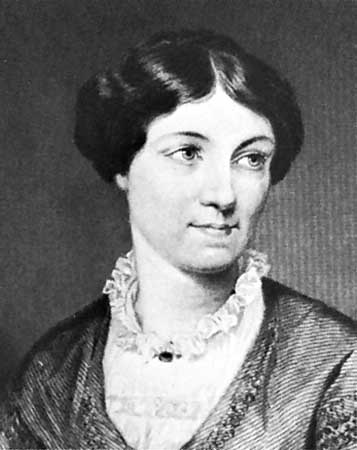
ENLARGE
|
Harriet Martineau, the daughter of a textile manufacturer from
Norwich, was born in 1802. Following her education, she began
writing articles in the 1820s for the Monthly Repository
and in 1829 moved to London and joined the staff of this journal.
She broadened her writing to include books on politics and
economics directed to the general public. Among her influences
were Jeremy Bentham and John Stuart Mill. Her 1832 book, Illustrations
of Political Economy sold well, which was followed by Poor
Laws and Paupers Illustrated (1834).
Martineau then visited the United States for two years, recorded
her observations in the book, Society in America (1837),
which commented on the many contradictions between stated
democratic principles and the reality of life for many Americans,
particularly women.
She suffered from poor health throughout much of her life and
died of bronchitis in 1876.
The old practice of man holding man as property is nearly
exploded among civilized nations; and the analogous barbarism of
man holding the surface of the globe as property cannot long
survive. The idea of this being a barbarism is now fairly formed,
admitted and established among some of the best minds of the time;
and the result is, as in all such cases, ultimately secure.
[From: Autobiography (1855),
Vol.II, Sec. 10, p. 119]
|
Martineau,
Harriet
|
Before any effectual social renovation can take place, men
must efface the abuse which has grown up out of the transition
from the feudal to the more modern state; the abuse of land being
held as absolute property.
[From: Autobiography (1855),
Vol.II, Sec. 10, p. 119]
|
Marx,
Karl

ENLARGE
|
Monopoly of land is the basis of monopoly in capital.
|
Marx,
Karl |
We have seen that the expropriation of the mass of the people
from the soil forms the basis of the capitalist mode of
production. The essence of a free policy, on the contrary,
consists in this: That the bulk of the soil is still public
property, and every settler on it, therefore, can turn part of it
into his private property and individual means of production
without hindering the later settlers in the same production.
[From: Capital, Chap. XXXIII,
English Translation, pp. 793-4]
|
McArdle,
Peter J. |
Peter J. McArdle (1874-1940) was first elected to Pittsburgh City
Council in 1911; he served for over 27 years. He was a member of
the City Planning Commission. Previous to public office he had
worked in a rolling mill and was active in union councils within
the steel industry.
The graded tax law has, in my opinion, been of decided benefit
to the City, and to home owners in particular, by furnishing an
added impetus to the development of vacant land located within the
city limits.
[Source of the above quote is not
known. Reprinted from literature published by the Henry George
Foundation of America]
|
McConnell,
Campbell

ENLARGE
|
In the cities the present arrangement of relatively high
property taxes on buildings and relatively low taxes on land tends
to have perverse effects upon incentives. The relatively light
taxes on land mean that landowners find the tax costs involved in
holding vacant land ot be comparatively small, and so they are
encouraged to withhold land form productive uses in order to
speculate on increases in its value. Such action -- or inaction --
prevents growth of the property-tax base and contributes to the
fiscal problems of the cities.
[Quote from the textbook, Economics,
1978 edition, p.754]
|
McGinnis,
Bernard B. |
As a young man active in Democratic politics and civic
movements, I joined in a popular movement in 1913 which resulted
in the Legislature adopting a Graded Tax for cities of the second
class. It was a very simple measure endorsed by leading civic
organizations and newspapers and sponsored politically by William
A. Magee, then the Republican Mayor of Pittsburgh.
Since 1925 the cities of Pittsburgh and Scranton have taxed all
dwellings and other buildings at just one-half of the rate levied
on the land; the purpose being to encourage private improvements
to real estate and to discourage the holding of valuable land for
speculation.
This Graded Tax plan is generally accepted in Pittsburgh and has
meant lower taxes for the great majority of home owners as well as
for others whose properties are well improved. It has been
strongly supported through the years by our Mayors and Councilmen,
both Republican and Democratic. It is also helping Scranton to
attract new industries and to lower taxes on homes.
[Pennsylvania State Senator, 1959]
|
McGlynn,
Edward (Father)

ENLARGE
|
He was simply a seer, a prophet, a forerunner sent by God, and
we can say in all reverence and in the words of the Scriptures
when they said that "There was a man sent from God, whose
name was John he was sent to bear witness to the light." I
believe I am not guilty of any profanation of the sacred
Scriptures when I say there was a man sent from God, and his name
was Henry George.
[source not known]
|
Michener,
James

ENLARGE
|
No nation can avoid land reform. All it can do is to determine
the course it will take: bloody revolution or taxation.
|
Mill,
James
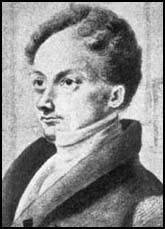
ENLARGE
|
James Mill discussed land taxation much more fully than did Adam
Smith or Ricardo. In his Political Economy, 1821, he suggested [p.
243] that in a new country the rent of land would be a source
peculiarly adapted to defray the expenditures of the state without
burdening anyone. But in old countries:
... where land has ... been converted into private property,
without making rent in a peculiar manner answerable for the public
expenses; where it has been bought and sold upon such terms, and
the expectations of individuals have been adjusted to that order
of things, rent of land could not be taken to supply exclusively
the wants of the government without injustice.
James Mill's Political Economy is noteworthy in that it contains
the earliest thorough consideration of the merits of a tax upon
the "unearned increment" of land values. Much of the
credit should be given to James Mill rather than, as is usual, to
his more distinguished son. James Mill wrote in Political Economy
[p.247]:
This continual increase, arising from the circumstances of the
community, and from nothing in which the land-holders themselves
have any peculiar share, does seem a fund no less peculiarly
fitted for appropriation to the purposes of the state, than the
whole of the rent in a country where land had never been
appropriated.
|
Mill,
John Stuart

ENLARGE
|
John Stuart Mill, in his Political Economy, 1848, took
the position that land ownership is less justifiable than the
ownership of other wealth. "Landed property," he said, "is
felt, even by those most tenacious of its rights, to be a
different thing from other property."
When the sacredness of property is talked of, it should always
be remembered that any such sacredness doe snot belong in the same
degree to landed property. No man made the land. It is the
original inheritance of the whole species. Its appropriation is
wholly a question of general expediency. When private property in
land is not expedient, it is unjust. It is no hardship to anyone
to be excluded from what others have produced: they were not bound
to produce it for his use, and he loses nothing by not sharing in
what otherwise would not have existed at all. But it is some
hardship to be born into the world and to find all nature's gifts
previously engrossed, and no place left for the new-comer. [book
2, ch. 2, sec. 26.]
The ordinary progress of a society which increases in wealth, is at all
times tending to augment the incomes of landlords; to give them both a
greater amount and a greater proportion of the wealth of the community,
independently of any trouble or outlay incurred by themselves. They grow
richer, as it were in their sleep, without working, risking, or
economizing. What claim have they, on the general principle of social
justice, to this accession of riches? [Book 5 Chapter 2 Section 28]
|
Mill,
John Stuart |
Those who think that the land of a country exists for the sake
of a few thousand land-owners, and that so long as rents are paid,
society and government have fulfilled their function, may see in
this consummation a happy end to Irish difficulties. But this is
not a time, nor is the human mind now in a condition, in which
such insolent pretensions can be maintained. The land of Ireland,
the land of every country, belongs to the people of that country.
[From: Political Economy,
Book II., Chap. 10, Sec. 1]
|
Mill,
John Stuart |
A tax on rent falls wholly on the landlord. There are no means
by which he can shift the burden upon anyone else.
[From: Elements of Political
Economy, Book V, Chap. III, Sec. 2]
|
Mill,
John Stuart |
The essential principle of property being to assure to all
persons what they have produced by their labor and accumulated by
their abstinence, this principle cannot apply to what is not the
product of labor, the raw material of the earth.
[From: Political Economy,
Book II, Chap. 2, Sec. 5]
|
Mill,
John Stuart |
When the "sacredness of property" is talked of, it
should always be remembered that any such sacredness does not
belong in the same degre to landed property.
[From: Political Economy,
Book II, Chap. 2, Sec. 6]
|
Mill,
John Stuart |
The greatest "burthen on land is the landlords."
[From: Elements of Political
Economy, Book II, Chap. 2, Sec. 6]
|
Mill,
John Stuart |
The social problem of the future we consider to be how to
unite the greatest individual liberty of action with a common
ownership in the raw material of the globe, and an equal
participation of all in the benefits of combined labor.
[From: Autobiography, Chap.
VII, p.232]
|
Mill,
John Stuart
|
The ordinary progress of a society which increases in wealth
is at all times to augment the incomes of landlords -- to give
them both a greater amount and a greater proportion of the wealth
of the community, independently of any trouble or outlay incurred
by themselves. They grow richer as it were in their sleep, without
working, risking or economizing. What claims have they, on the
general principlesof social justice, to this accession of riches?
[From: Principles of Political
Economy, Book V, Chap. 2, Sec. 5]
|
Miller,
Karen |
Secretary of the Pennsylvania Department of Community Affairs,
responded to a question from Walter Rybeck about whether her
Housing Task Force had looked at the two-rate property tax, as
follows:
No, because the eleven cities using that form of property tax
don't have an affordable housing problem.
|
Mitchell,
Margaret

ENLARGE
|
Land is the only thing in the world that amounts to anything,
for 'Tis the only thing in this world that lasts, 'Tis the only
thing worth working for, worth fighting for -- worth dying for.
|
Modigliani,
Franco

ENLARGE
|
It is important that rent of land be retained as a source of
government revenue. Some persons who could make excellent use of
land would be unable to raise money for the purchase price.
Collecting rent annually provides access to land for persons with
limited access to credit.
[Franco (1918-1985) was the 1985 winner
of the Nobel Prize for economics]
|
Moley,
Raymond
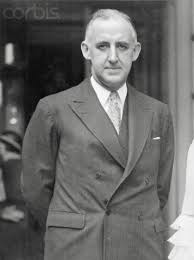
ENLARGE
|
Private investment for urban rebuilding can be attracted by
modifying our tax system to encourage new construction and better
land use. High land taxes and lower levies on improvements will
compel owners to build or sell to those who will build. To a
greater extent this emphasis on a change to land taxation is being
accepted by planners, architects, public authorities and
economists.
The point is not a new one. Those who improve their property are
now penalized by higher taxes. Those who maintan slums are
rewarded by a rise in land values.
[From: Newsweek, August 21,
1967]
|
Mondale,
Walter
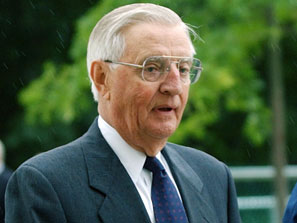
ENLARGE
|
As you know, land is subject to local rather than federal
jurisdiction, but it would be interesting to see the results of
local experiments along the lines you suggest. One of the great
advantages of our federal system is that it permits such
experiments to take place.
There are, however, a number of things which the federal
government could do to further the taxation of land values. It
could levy such a federal tax itself and this would be much
preferable to taxes on labor and capital investment. It could
establish a new city based solely on land value taxation in order
to demonstrate the feasibility of that principle. It could remove
the income tax deduction for the property tax insofar as it falls
on buildings, thereby encouraging localities to raise more of
their property tax on land instead. And finally, it could so
adjust the revenue sharing formula that the more a city relies on
the taxation of land values for its local revenue, the larger its
federal revenue share would be.
[From a letter dated May 19, 1983 to
the editor of Incentive Taxation]
|
Moore,
Stephen
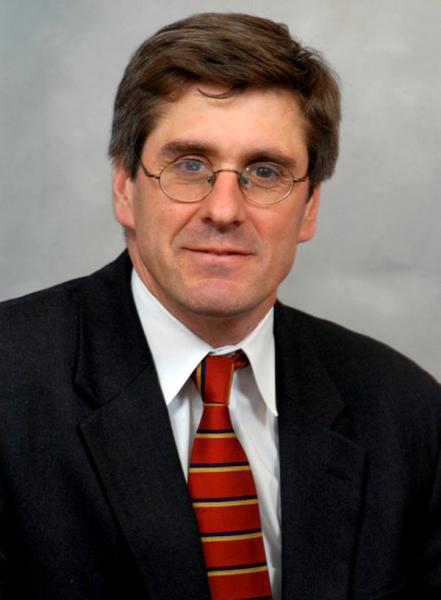
ENLARGE
|
I have long been an admirer of the Henry George philosophy, as
I think most of us here at the Cato Institute are.
[199-]
|
More,
Thomas

ENLARGE
|
When an insatiable wretch, who is a plague to the whole
country, resolves to enclose many thousand acres of ground the
owners as well as the tenants are turned out of their possessions
by trick or by main force, or being wearied out with ill usage
they are forced to sell them.
[From: Utopia (1516), Book I]
|
More,
Thomas |
"The increase of pasture", said I, "by which
you sheep, which are naturally mild, and easily kept in order, may
be said now to devour men, and unpeople, not only villages, but
towns; for wherever it is found that the sheep of any soil yield a
softer and richer wool than ordinary, there the nobility and
gentry, and even those holy men the abbots, not contented with the
old rents which their farms yielded, nor thinking it enough that
they, living at their ease, do not good to the public, resolve to
doit hurt instead of good. They stop the course of agriculture,
destroying houses and towns, reserving only the churches, and
enclose grounds that they may lodge their sheep in them.
As if forests and parks had swallowed up to little of the land,
those worthy countrymen turn the best inhabited places in
solitudes, for when an insatiable wretch, who is a plague to his
country, resolves to enclose many thousand acres of ground, the
owners as well as tenants are turned out of their possessions, by
tricks, or by main force, or being wearied out with ill-usage,
they are forced to sell them. By which means those miserable
people, both men and women, married and unmarried, old and young,
with their poor but numerous families (since country busines
requires many hands), are all forced to change their seats, not
knowing whither they go; and they must sell almost for nothing
their household stuff, which could not bring them much money, even
though they might stay for a buyer.
When that little money is at an end, for it will be soon spent,
what is left for them to do, but either to steal and so to be
hanged (God knows how justly), or to go about and beg? And if they
do this, they are put in prison as idle vagabonds; while they
would willingly work, but can find none that will hire them; for
there is no more occasion for country labor, to which they have
been bred, when there is no arable ground left. One shepherd can
look after a flock which will stock an extent of ground that would
require many hands if it were to be ploughed and reaped. This
likewise in many places raises the price of corn.
[From: Utopia (1516), Book 1]
|
More,
Thomas
|
There is a great number of noblemen among you, that are
themselves as idle as drones, tht subsist on other men's labor, on
the labor of their tenants, whom, to raise their revenues, they
pare to the quick.
[From: Utopia (1516), Book I]
|
More,
Thomas
|
For they account it a very just cause of wr for a nation to
hinder others from possessing a part of the soil, of which they
make no use, but which is suffered to lie idle and cultivated;
since every man has by the law of Nature a right to such waste
portion of the earth as is necessary for his subsistence.
[From: Utopia (1516), Book II,
tit. Of Their Traffic]
|
Morley,
John

ENLARGE
|
It will be thought an intolerable thing that men shall derive
enormous increments of income from the growth of towns to which
they have contributed nothing -- that they shall be able to sweep
into their coffers what they have not produced -- that they shall
be able to go on throttling towns, as they are well known to do in
some cases. It is impossible to suppose that the system will not
be vigorously, powerfully, persistently and successfully attacked.
[From a speech at Forfar, 4 October,
1897. Reprinted in The Times, 5 October, 1897, p.5, column
3]
|
Morris,
William
(1834-1896)

ENLARGE
|
Toward the end of the 1870s, Morris became increasingly involved
in political activism, and by 1883 he had joined H. M. Hyndman's
Socialist League. Rejecting Hyndman's grand plan to unify all
socialist groups in England, Morris helped form the new Socialist
League and became the editor of its journal. When the Socialist
League waxed more extreme and the prospects for real revolution
grew dim, Morris left the organization and founded the Hammersmith
Socialist Society, which met at Kelmscott House and served as a
forum for Sunday evening lectures and discussion on political and
social issues.
Not seldom a piece of barren ground or swamp, worth nothing in
itself, becomes a source of huge fortune to him from the
development of a town or a district, and he pockets the results of
the labor of thousands upon thousands of men, and calls it his
property.
[From: Signs of Change
(1888), p.188]
|
Morris,
William
|
Society will be changed from its basis when we make the form
of robbery called profit impossible by giving labor full and free
access to the means of fructification -- i.e., to raw material.
[From: Signs of Change
(1888), p.201]
|
Moses |
It is written in Leviticus X MV:XXIII that Jehovah said to Moses:
The land shall not be sold forever; for the land is mine.
|
Murphey, Dwight D.
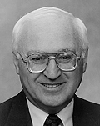
ENLARGE
|
Do Market Economies Allocate Resources Optimally? A response by
Dweight D. Murphey, Prof. of Business Law, Wichita State
University, to Walter Block:
Nor are such societies sufficiently sensitive to the moral
issues. An inequality borne out of differences in ability, effort,
character, market discernment, and the like, is a morally
justifiable inequality. But, as henry George pointed out a century
ago, some wealth accrues to individuals without any relationship
either to merit or to a productive meeting of consumers' needs.
George made this point with regard to the increase in land values
that comes from increasing population near the land. During the
past century, most classical liberals, including myself until
recently, have not become followers of George (who was in all
other ways a devout free-market thinker) because it has seemed
better to let the market work without qualification than to make
an admission that socialists could use to their own advantage.
Now, however, with the rapid advance of computerization, robotics,
materials sciences, and biotechnology, Henry George's observation
becomes even more pertinent. Those in the year 2030, for example,
who make a fortune as computer experts will make only a part of
that income from their own effort; instead, they will have
inherited from the civilization in which they live the work of
countless geniuses who will have preceded them, and much of their
income will be due to those previous successes. How appropriate
will it be then to say that "any amount of inequality is all
right, because it arises out of the successful peoples' success in
the market"? Will future classical liberals be able to say
that with a clear conscience if billions of people are faring
quite badly?
[From: Markets & Morality,
Vol. 2, No. 2, Fall 1999]
|
Murphy,
Dennis |
If you improve your home by remodeling or building an
addition, your taxes will rise, because we tax the improvements.
If you own a rental property, and make improvements for your
tenants, the taxes will increase, regardless of location. Tax only
the land and tax it at a rate appropriate to its highest and best
use.
The results would be dramatic.
Would the old Flame Tavern sit empty year after year? Or would
ordinary economic incentives push the owners -- whom, by the way,
I do not know -- to either make better use of the opportunities
presented by these sites or sell to willing buyers who would?
[Dean of the College of Business & Economics, Western
Washington University. Quote from the Bellingham Washington
Herald, June 2, 1966]
|
Murray,
J.F.N. |
Murray is a prominent assessor and author of Principles and
Practice of Valuation, (Sidney. Commonwealth Institute of
Valuers, Fourth Edition, 1969, a leading textbook on appraising in
Australia.
Valuation is the most important subject in the social
sciences, but it has always been outside the scope of economics as
taught in the universities. ...It is maintained that a
re-integration of the theory of valuation with the main body of
economic theory would lead to an advancement of learning and to a
soundly-based national economy.
[source not identified, only in 1967,
from an academic publication]
|
Muskie,
Edmund

ENLARGE
|
We must ask whether it is fair that our federal tax laws --
which mermit homeowners to deduct property tax payments from their
income tax -- provide no real relief for apartment dwellers whose
rent is increased by their landlords as a result of these same
property taxes.
Still a more basic question is whether any property taxes should
be levied against buildings and improvements (or) whether they
should be levied completely or primarily on land value itself.
[There is a good argument that it is] socially undesirable [to tax
the land speculator less than the owner who improves his proerty,
that urban decay can be blamed on property taxes which penalize
properties, and that property taxes encourage land speculation
rather than logical land development].
[Source: Hugh I. Morris. "Muskie
Weighs Probe Of Property Taxes," The Evening Bulletin,
8 January 1971.]
|
Nader,
Ralph
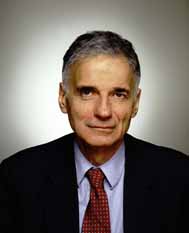
ENLARGE
|
Nader's group Public Citizen wrote a booklet recommending:
We reduce taxes on people and increase taxes on nonrenewables.
A 1994 commentary on urban sprawl contained this observation
about the property tax:
Site-value property taxation may also spark greater
development in cities by taxing land, not buildings. Unlike
traditional taxation -- which rewards developers who put up cheap,
tacky housing and strip malls -- site-value taxation gives
developers the incentive to build gracious, durable buildings.
Allowances for affordable housing, however, need to be part of
site-value schemes.
|
Nader, Ralph |
We need a big debate on different kinds of taxation, to talk
about how corporations are freeloading on public services and
getting tax breaks while taxes are falling on workers and smaller
businesses. We need to open a debate about land taxation and Henry
George, to tax bad things, not good things, and not to tax people
who go to work every day.
|
Nechyba,
Thomas J.

ENLARGE
|
The idea tht land value taxation is unrealistic or would drive
land prices into negative numbers is based on a static view of the
economy, where no one responds to tax changes by substituting one
factor for another. Once you accept that behavior will change in
response to taxes, that static view no longer applies. Under these
fairly conservative assumptions, tax reforms that use land taxes
to eliminate entire classes of distortionary taxes are
economically feasible in virtually all states.
[From a "Faculty Profile"
interview published in Land Lines, the newsletter of the
Lincoln Institute of Land Policy, January 2002. Mr. Nechyba is
professor of economics at Duke University, Durham, N.C.]
|
Necker,
Jacques

ENLARGE
|
Nearly all civil institutions were made for the benefit of the
rich. If we peruse our books of law, we are startled at finding
everywhere the confirmation of teh fact. It could almost be said
that a few people, after dividing the earth among themselves,
ordained laws to fortify themselves against the multitude.
[From: Essay on the Corn-Laws
(1775), Part III, Chap. 12, Oeuvres, Vol. I, p. 333]
|
Necker,
Jacques
|
The right of inheriting property is a law of men; it was
established for their welfare and can only be continued on that
condition. He who, at the beginning of society, staked out a piece
of ground, and threw there some seed which nature had
spontaneously produced elsewhere, could never have obtained on
this title alone the exclusive right of holding the ground for his
descendants forever.
[From: Essay on the Corn Laws
(1775), Oeuvres Completes, Vol.I, p.142]
|
New Republic editors |
As Henry George explained more than a century ago in Progress
and Poverty, the cost of natural resources is nothing more than a
tax on the productive elements of the economy -- labor and
capital.
|
Newcomb,
Simon
(1835-1909)

ENLARGE
|
The doctrine that the soil is of natural right the
common property of the human race, and that each individual should
be allowed to enjoy his share, is now tacitly admitted by many
eminent economists in England and France.
[From: "The Labor Question,"
North American Review, July, 1879, p.151]
|
Newman,
Francis William
|
Newman was born in Born in London, and graduated from Oxford in
1826. He was elected fellow of Balliol College Oxford in the same
year but resigned in 1830, leaving for Baghdad to serve as
assistant in the mission of the Rev. A. N. Groves. In 1833 he
returned to England and eventually accepted the position of
classical tutor in an unsectarian college at Bristol. In 1840 he
became Professor of Latin in Manchester New College, a Unitarian
seminary at York. In 1846 he quit this appointment to become
professor in University College, London, where he remained until
1869. In 1850, he produced ttwo works, Phases of Faith and
Passages from the History of my Creed, the former an analysis of
the relations of the spirit of man with the Creator; the latter a
religious autobiography detailing the author's passage from
Calvinism to pure theism.
He also wrote on logic, political economy, English reforms,
Austrian politics, Roman history, and many other subjects. His
miscellaneous essays were collected in several volumes before his
death. He died in 1897.
Here is the fundamental error, the crude and monstrous
assumption, that the land which God has given to our nation, is or
can be the private property of anyone. It is a usurpation exactly
similar to that of slavery.
[From: Lectures on Political
Economy (1851), Lecture VI., p. 133]
|
Netzer,
Dick
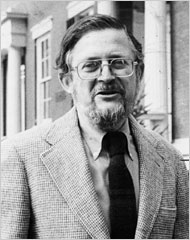
ENLARGE
|
My ideal system of local finance would comprise user charges
and land value taxation.
[Dean, Graduate School of Political
Science, New York University; quote from Property Tax Reform,
Urban Institute, 1973, edited by George Peterson]
|
Netzer,
Dick |
User fees and land-value taxation are considered by most
experts as the best way to finance city government.
[Dean, New York University; from
remarks at a 1982 meeting of the Federal Reserve Bank in
Philadelphia]
|
NEW YORK TIMES |
Too bad that Henry George, the author of Progress and Poverty,
is not around to advise New York State's Comptroller, Edward
Regan, on the economics of land and housing. Analyzing New York
City's J-51 program to stimulate the rehabilitation of old
buildings with tax concessions. Mr. Regan says it costs a fortune,
or at least too much. Henry George would have told Mr. Regan that
he has it exactly wrong. It's the tax on building improvements,
not the tax abatement, that leads to poverty.
[editorial, August 5, 1980]
|
Norquist,
John

ENLARGE
|
Question and Answer with Mayor John Norquist of Milwaukee,
Wisconsin. Tuesday, January 26, 1999, at The Landmark Series:
Q: Have you looked at alternative property tax systems such as
a two-tier land value based system to encourage efficient use?
A: Great idea and almost impossible to get politically.
Usually the constitutions in most states block it but it's been
great for Pittsburgh. You almost can't find an empty lot in
downtown Pittsburgh.They've done a lot of things wrong in
Pittsburgh but one thing they did right was having this land value
taxation so there's no incentive to have an empty lot. Having a
parking lot doesn't make sense economically so the buildings fill
in and you don't have these big empty spots. So if you can do it
in Minnesota, go for it. It's good for the city.
|
Norris,
Kathleen |
Any one who really fears a revolution in America ought to
reread Henry George's "Progress and Poverty," one of the
great social documents of all time. I first read it thirty years
ago. ...Today the book is good as ever, and the theory as sane.
... In all the years -- with the travel, study, opportunity for
observation of social conditions -- in all these yers I have never
known his premises to be shaken in the least.
|
Nowak,
Jeremy

ENLARGE
|
"Cities should abolish all business taxes that inhibit
the location of startup firms or discourage investment in
productivity-enhancing equipment or practices, including all forms
of gross receipts or turnover and net profits taxes. Cities should
also replace the business property tax with a tax on the market
value of land, coupling the land tax with the broader use of
business improvement districts or tax increment finance districts
to pay for major infrastructure investments. Land taxes, which may
initially be extraordinarily low, even zero, in some especially
distressed neighborhoods, have several advantages over property
taxes in keeping a city's economy competitive. They discourage
speculative land banking. They encourage businesses to place as
much capital on property as is economically justifiable because
non-land forms of real property are not taxed. They strongly
encourage city government practices that preserve the value of
land. And, finally, they are a powerful incentive to maintain
properties.
"Local personal taxes commonly take three forms: sales
taxes, wage or income taxes, and property taxes, the latter being
the most common. A residential property tax has two components-a
land tax and a tax on the value of the structure. The land
component of the residential property tax should be assessed on an
equal basis with the business land tax, again providing incentives
to develop in neighborhoods with low land values, as well as
preventing speculative land banking."
[From: "Only Radical Strategies
Can Help America's Most Distressed Cities," by Edward W. Hill
and Jeremy Nowak. Brookings Review, Summer 2000, Vol.18,
No.3, Pages 22-26]
|
Oates,
Wallace
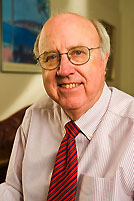
ENLARGE
|
What the Pittsburgh experience suggests to us is that the
movement to a graded tax system can, in the right setting, provide
some stimulus to local building activity. The primary role of the
land tax in all this is to provide the additional source of
revenues that allows a reduction in the rate on improvements.
[Professor of Economics, University
of Maryland; from a research report written with Robert Schwab]
|
Ogilvie,
William |
William Ogilvie, Professor of Humanities in King's College,
Aberdeen, was an eighteenth century thinker who anticipated
certain of Henry George's ideas. In 1782 he published anonomously
An Essay on the Right of Property in Land with respect to its
Foundation in the Law of Nature. He believed that the equal
right of all men to the earth was "a birthright which every
citizen still retains", and as a means for securing that
right he proposed a "progressive agrarian law", under
which men were to be permitted to claim their birthright share
from unoccupied lands, and those holding more than this share were
gradually to be deprived of their surplus of land, retaining,
however, the title to any improvements which they might have made.
Ogilvie's ideas on taxation were somewhat vague, but he wrote in
a footnote that he believed a land tax to be the most equitable
form of tax. The landowner, he believed, enjoyed a revenue without
performing a corresponding social service. He suggested a tax on
barren lands to force the owner either to cultivate or dispose of
them. Ogilvie was probably the first to suggest definitely a tax
on the increment of land values. He wrote:
A tax on all augmentation of rents, even to the extent of one
half of the increase, would be at once the most equitable, the
most productive, the most easily collected, and the least liable
to evasion of all possible taxes, and might with inconceivable
advantage disencumber a great nation from all those injudicious
imposts by which its commercial exchanges are retarded and
restrained, and its domestic manufactures embarrassed.[p.9]
Ogilivie also wrote about access to land as a natural right:
When a child is born, we recognise that it has a natural right
to its mother's milk, and no one can deny that it has the same
right to mother-earth. It is really its mother-earth, plus the dew
and sunshine from heaven and a little labour, that supplies the
milk and everything else required for its subsistence. The monster
that would deprive the babe of its mother's milk, or would
monopolise the breasts of several mothers, to the exclusion of
several children, is not more deserving of being destroyed than
the monster who seizes absolute possession of more than his share
of the common mother of mankind, to the exclusion of his
fellow-creatures.
[From the Preface to William
Ogilvie's "Birthright in Land" (1782), Augustus M Kelley
edition (1970), p.xix]
|
Ogilvie,
William |
Ogilvie begins his "Essay on the Right of Property in Land"
with the following:
1. "All right of property is founded either in occupancy
or labor. The earth having been given to mankind in common
occupancy, each individual seems to have by nature a right to
possess and cultivate an equal share. This right is little
different from that which he has to the freeuse of the open air
and running water; thought not so indispensably requisite at short
intervals for his actual existence, it is not less essential to
the welfare and right state of his life through all of its
progressive stages.
2. "No individual can derive from this general of occupancy
a title to any more than any equal share of the soil of his
country. His actual possession of more cannot of right preclude
the claim of any other person who is not already possessed of such
equal share.
3. "This title to an equal shre of property in land seems
original, inherent, and indefeasible by any act or determination
of others, though capable of being alienated by our own. It is a
birthright which every citizen still retains. Though by entering
into society and partaking of its advantages, he must be supposed
to have submitted this natural right to such regulations as may be
established for the general good, yet he can never be understood
to have tacitly renounced it altogether; --
4. "Every state or community ought in justice to reserve for
all its citizens the opportunities of entering upon or returning
to land resuming this their birthright and natural employment,
whenever they are inclined to do so.
"Whatever inconveniences may -- accompany this reservation,
they ought not to stand in the way of essential justice.
5. "In many rude communities, this original right has been
respected, and their pubilc institutions accommodated to it, by
annual, or at least frequent partitions of the soil, as among the
ancient Germans, and among the native Irish even in Spencer's
time.
"Wherever conquests have taken place, this right has been
commonly subverted and effaced.
"In the progress of commercial arts and refinements, it is
suffered to fall into obscurity and neglect.
7. "That right which the landholder has to an estate,
consisting of a thousand times his own original equal share of the
soil, cannot be founded in the general right of occupancy, but in
the labor which he and those to whom he has succeeded, or from
whom he has purchased, have bestowed on the improvement and
fertilization of the soil. To this extent, it is natural and just;
but such a right founded in labor cannot supersede that natural
right of occupancy, which nine hundred and ninety-nine other
persons have to their equal shares of the soil, in its original
state ..."
9. "On the first of these maxims depend the freedom and
prosperity of the lower ranks. On the second, the perfection of
the art of agriculture."
|
Ogilvie,
William |
The earth having been given to mankind in common occupancy,
each individual seems to have by nature a right to possess and
cultivate an equal share.
[From: Essay on the Right of
Property in Land (1781), Part I, Section I]
|
Ogilvie,
William |
Internal convulsions have arisen in many countries by which
the decisive power of the State has been thrown, for a short while
at least, into the hands of the collective power of the people. In
these junctures they might have obtained a just re-establishment
of their natural rights to independence of cultivation and to
property in land, had they been themselves aware of their title to
such rights, and had there been any leaders prepared ot direct
them in the mode of stating their just claim, and supporting it
with necessary firmness and becoming moderation.
[From: Essay on the Right of
Property in Land (1781), Part II, Section 3, Paragraph 57]
|
O'Rell,
Max

ENLARGE
|
I hold that the earth was meant for the human race and not for
a few privileged ones.
[From: North American Review,
January, 1899, p.36]
|
Paine,
Thomas
(1737-1809)
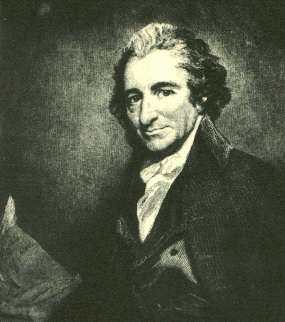
ENLARGE
|
In the age of rebellion against monarchy and landed aristocracy,
Paine brought his ideas from the Old World to North America. He
wrote the pamphlet Common Sense which helped to ignite the
spirit of rebellion in the colonial citizens of England's
colonies. In a later pamphlet, Agrarian Justice, he wrote:
[I]t is the value of the improvement, only, and not the earth
itself, that is individual property. Every proprietor, therefore,
of cultivated lands, owes the community a ground-rent (for I know
of no better term to express the idea) for the land which he
holds; and it is from this ground-rent that the fund proposed in
this plan is to issue. ...The plan I have to propose ... is, To
create a national fund, out of which there shall be paid to every
person, when arrived at the age of twenty-one yers ... a
compensation in part, for the loss of his or her natural
inheritance, by the introduction of landed property ...
Men did not make the earth, and though he had a natural right to
occupy it, he had no right to locate as his property in perpetuity
any part of it; neither did the Creator of the earth open a
land-office, from whence the first title-deeds should issue.
"The earth, in its natural state … is supporting but
a small number of inhabitants, compared with shat it is capable of
doing in a cultivated state. And impossible to separate the
improvement made by cultivation from the earth itself upon which
that improvement is made, the idea of landed property arose from
that inseparable connection; but it is nevertheless true that it
is value of the improvement only, and not the earth itself, that
is individual property. Every proprietor, therefore, of cultivated
land owes to the community a ground-rent, for I know no better
term to express the idea by, for the land which he holds. …Cultivation
is one of the greatest natural improvements ever made. . . .But
the landed monopoly that began with it has dispossessed more than
half the inhabitants of every nation of their natural inheritance."
[Thomas Paine, Agrarian Justice, 1797]
|
Paley,
William
(Archdeacon of Carlisle)

ENLARGE
|
If you should see a flock of pigeons in a field of corn, and
if (instead of each picking where and what he liked, taking just
as much as it wanted and no more) you should be ninety-nine of
them gathering all they got into a heap and reserving nothing for
themselves but the chaff and refuse; keeping this heap for one,
and that the weakest, perhaps worst, pigeon of the flock; sitting
round and looking on all the winter whilst this one was devouring,
throwing about and wasting it; and if a pigeon more hardy or
hungry than the rest touched a grain of the hoard, all the others
instantly flying upon it and tearingit to pieces -- if you should
see this you would see nothing more than what is every day
practiced and established among men.
[From: Moral and Political
Philosophy (1785), Book III, Part I., Chap. 1]
|
Paley,
William
|
We now speak of property in land; and there is a difficulty in
explaining the origin of this property consistently with the law
of nature; for the land was once, no doubt, common; and the
question is, how any particular part of it oculd justly be taken
out of the common and so approprirated to the first owner as to
give him a better right to it than others; and what is more, a
right to exclude others from it. Moralists have given many
different accounts of this matter, which diversity alone, perhaps,
is a proof that none of them are satisfactory.
[From: Moral and Political
Philosophy (1785), Book III, Part I, Chap. 4]
|
Penn,
William
(1644-1718)

ENLARGE
|
One of the first to recognize the promise of ground rents as a
just source of public revenue was William Penn, the founder of
the North American colony of Pennsylvania. Penn wrote in 1682:
If all men were so far tenants to the public that the
superfluities of grain and expense (meaning "surpluses")
were applied to the exigencies thereto (meaning "community
needs"), it would put an end to taxes, leave not a beggar,
and make the greatest bank for national trade in Europe.>
[From: Reflections and Maxims, Sec. 222, Works V.,
pp. 190-1]
|
PENNSYLVANIA
ECONOMY
LEAGUE |
From a 1988 study, Revised Recovery Plan for the City of
Clairton, Pa:
... attaching different millage rates to land and buildings
will accomplish a more equitable distribution of the property tax.
|
Pettigrew,
R.F.
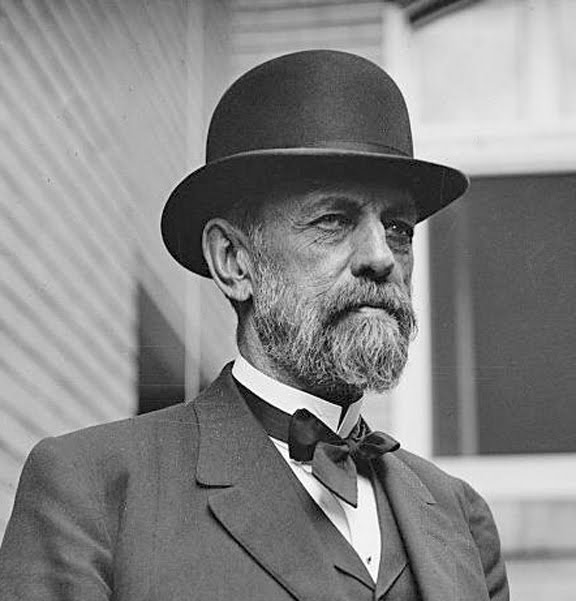
ENLARGE
|
From a letter written 19, July, 1917 printed in Everyman (October
1917) by R.F. Pettigrew, former U.S. Senator from the state of
South Dakota:
Tax reform has been tried since the days of Ham Arabbie who
announced it in a code of laws of Babylon 2300 years before
Christ. But the Single Tax (another name for free land) is of more
recent origin and thereis but one form of it.
|
Phelps,
William Lyon |
I am delighted to have the Anniversay edition of "Progress
and Poverty." When I was an undergraduate in college, in the
year 1998, Professor Arthur Hadley, later President Hadley,
devoted an entire course in my senior year to this book.
|
Plato
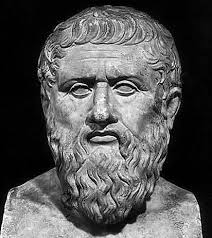
ENLARGE
|
When discord arose, then the two races were drawn different
ways; the iron and brass fell to acquiring mney and land and huses
and gold and silver; but the gold and silver races, having the
true riches in their own nature, inclined towards virtue and the
ancient order of things. There was a battle between them, and at
last they agreed to distribute their land and houses among
individual owners; and they enslaved their friends and
maintainers, whom they had formerly protected.
[From: The Republic, Jowett's
Translation, Book VIII., p.547 (words ascribed to Socrates)]
|
Pliny
(Gaius Plinus Secundus) |
It is the wide-spread domains that have been the ruin of
Italy, and soonwill be that of the provinces as well.
[From: Natural History, Book
XVIII., Chap. 7]
|
Plutarch

ENLARGE
|
To the end therefore that he might expel out of the state
arrogance and envy, luxury and crime, and those yet more
inveterate diseases of want and superfluity, he obtained of them
to renounce their properties, and to consent to a new division of
the land, and that they should live altogether on an equal
footing, -- merit to be their only road to eminence, and the
disgrace of evil, and credit of worthy acts, their one measure of
difference as between man and man.
[From: Life of Lycurgus]
|
Plummer,
W.C. |
In 1930, he held the position of Assistant Professor of
Economics, University of Pennsylvania, Philadelhia, Pennsylvania
While the right of property denotes in every state of society
the largest powers of exclusive control over wealth which the law
accords, yes, ... these powers of exclusive use and control are
various and differ greeatly in different times and places.
...Private property ... in land has always ocupied a strong
position in the United States, and continues to do so at the
present time. ...
Taxes upon land are a distinct limitation of private property
rights. Land possesses certain characteristics not found in other
classes of wealth, and for this reason it has often been regarded
as a subject for special taxes. ...The purpose of such taxes, if
they are comparatively small, is to raise revenue for the support
of the Government; but if they are very large, the predominating
purpose is usually to bring about reforms in the social system.
[From: "Limitations to Private
Property Rights in Land in the United States," The Annals
of The American Academy of Political and Social Science, Vol.
CXLVIII, No. 237, March, 1930, p.56]
|
Plummer,
W.C. |
Since the publication of Progress and Poverty in 1879 by Henry
George, in which he advocated what is known as the single tax,
there have been numerous individuals and groups who would like to
bring about radical changes in the socio-economic order by further
limiting private property rights through heavier taxes on land.
The advocates of the single tax contend that the Government should
take in taxes the entire economic rent of land, and that this
should be the only form of taxation. The use of the single tax
would mean practically the abolition of private property in land
and the substitution of community ownership. There would probably
remain the right of private possession, of alienation, and of use
for productive purposes, but the user of the land would be
compelled ot pay to society, in the form of taxes, the full
economic rent. ...Since the market value of land depends upon its
present and anticipated future income, the introduction of the
single tax would take from the present owners the equivalent of
the entire value of their land.
[From: "Limitations to Private
Property Rights in Land in the United States," The Annals
of The American Academy of Political and Social Science, Vol.
CXLVIII, No. 237, March, 1930, p.57]
|
Pollock,
Frederick
(1845-1937)

ENLARGE
|
Pollock was an English jurist, educated at Eton and Cambridge and
admitted to the bar in 1871. He became professor of jurisprudence
at Oxford in 1883, a position he retained until 1903. He devoted
After 1914 he served as judge of the admiralty court of the Cinque
Ports. His main writings included: The Principles of Contract
(1876) and the Law of Torts (1887). Pollock also served as
editor of the Law Quarterly Review from 1885 to 1919 and
editor in chief (1895–1935) of the Law Reports from
1895 to 1935. He collaborated with F. W. Maitland on The
History of English Law (1895), contributing the material on
Anglo-Saxon law.
It is commonly supposed that land belongs to its owner in the
same sense as money or a watch; this has not been the theory of
the English law since the Norman Conquest, nor has it been so in
its fullest significance at any time. No absolute ownership of
land is recognized by our law-books except in the Crown. All lands
are supposed to be held immediately or mediately of the Crown,
though no rent or services may be payable and no grant from the
Crown on record.
[From: Land Laws, Chap. I, p.
12]
|
Precy,
Monsieur V. |
In 1930, this French advocate of land value taxation wrote:
"And so it is with the greatest satisfaction that I am
able to quote here the pronouncement made by Robert Smillie, the
English miners' leader, in October 1921: 'It is only lately that I
have come to understand that the root of the whole social problem
is to be found in the land question. As long as access to land
remains forbidden to those who could put it to a useful purpose,
we shall always see crowds of men, cap in hand, at the doors of
our factories."
|
Pufendorf,
Samuel

ENLARGE
|
In prnciple I do not see why the sea should be dispensed from
serving our need and comfort, any more than the land. However ...
men were left free to make private property of the sea as well as
of the land, or to leave it in its primitive state, common to all,
so that it should not belong to one more than to another.
[From: Law of Nature and Nations
(1672), Book IV, Chap. 5, Sec. 5]
|
Pufendorf,
Samuel
|
All that natural law does is to suggest the establishment of
property when the welfare of human society demands it, leaving it
to the wisdom of men to determine whether they should allow
private property in all things or only in some, and whether they
should hold those which they appropriate separately or in common,
leaving the rest to the first occupant, so that no one can assume
the right to enjoy them alone.
[From: Law of Nature and Nations
(1672), Book IV, Chap. 4, Sec. 4]
|
Putland,
Gavin
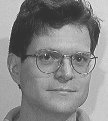
ENLARGE
|
Gavin Putland, at the Signal Processing Research Centre,
Queensland University of Technology in Brisbane, Australia, wrote:
There is a better way to improve the competitiveness of a
country's industries: reduce taxes that are passed on in prices
and increase taxes that are not. The range of taxes that are built
into prices is wider than is generally supposed. ...Taxes on land
values, in contract, fall entirely on landowners and cannot be
passed on in prices. Landowners cannot withdraw land from use in
order to force users to pay the tax, because the withdrawn land
generates no income to cover the tax. There is no surer way to
make a country more competitive, thus protecting jobs in its
industries, than to replace taxes on labour and capital with taxes
on land values.
[From: a World Bank internet
discussion, 19 March 2000]
|
Quesnay,
Francois
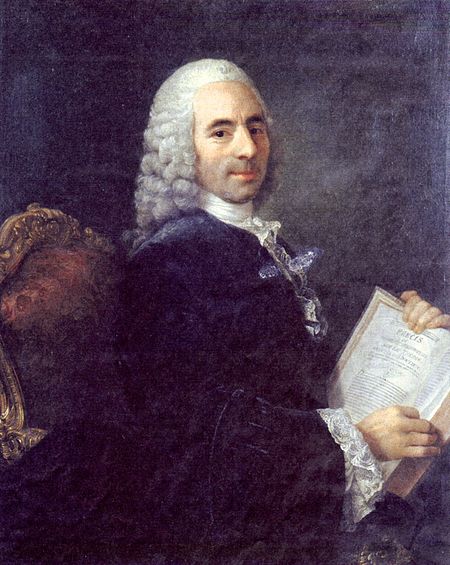
ENLARGE
Turgot,
A.R. Jacques

ENLARGE
|
During the late eighteenth century in France, the school of
political economists known as the Physiocrats, which included the
royal physician, Francois Quesnay and finance minister,
A. R. Jacques Turgot , also recognized the power of
collecting ground rent for public purposes. They expressed this
thought and coined the phrase "impot unique" (i.e., "the
single tax").
... the form of assessment which is the most simple, the most
regular, the most profitable to the state, and the least
burdensome to the tax-payers, is that which is made proportionate
to and laid directly on the source of continually regenerated
wealth (land).
|
BROWSE BY AUTHOR
|























 THRU
THRU
